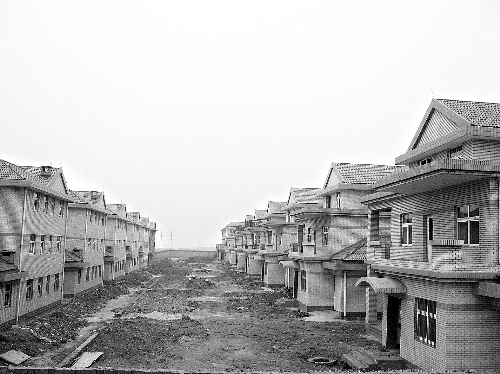In Xinzhuang, a village located at the foot of Mount Taihang in the suburb of Shijiazhuang, the capital city of Hebei Province, stands 18 high-end nearly completed houses. Thirty-six related persons, including senior officers and some ordinary staff members from the Shijiazhuang Public Security Bureau, as well as their relatives, bought about 20 mu (13,200 sq m) of land from the village and planed to build 36 houses there, according to a Beijing News report on January 16.
The nearly-completed high-end houses in Xinzhuang, Hebei Province.
It is said that these public security bureau staff members leveraged their power to relocate their hukou (permanent residence permits) in Xinzhuang and then managed to get land acquisition approval from relevant authorities through regulation-violating practices. But in fact, their hukous are still registered in Shijiazhuang. It is still unclear how they managed to bypass regulations and rules in order to acquire so much land.
In early 2003, Xie Mingxin, then a section chief of the Shijiazhuang Public Security Bureau and also wife of the bureau's deputy director, Guo Suoshan, went to Xinzhuang with her colleague, Han Jianyong. They told Zhang Jinhai, the village's Party chief at that time, that they planned to build a local mineral water plant to provide the villagers with more job opportunities on the condition that the village sold some land to them. The village was an ideal place for them to spend their retirement and the bureaucrats commented that they hoped to build facilities for themselves in the area.
Zhang discussed the matter with Xue Lanhe, director of the village committee. He believed that the prospective mineral water plant would help to boost his fellow villagers' annual income of less than 2000 yuan (US$278) per capita on average. Zhang and Xie accordingly convened a meeting attended by resident representatives. All the participants reached consensus and passed the land-selling plan in the hopes of getting a mineral water plant in exchange. Additionally, they agreed to offer a good price, 15,000 per mu, or 25 percent cheaper than the usual price.
Afterwards, Xie Mingxin and the village authorities signed a formal land transaction agreement. Accordingly, the latter shall spare no efforts to help the former to go through the necessary land transaction process. Then there came the first and also the most difficult barrier. According to Land Administration Regulations of Hebei Province, only those who get their hukou registered at a village are qualified to owning land for housing in the area. With hukous registered at Shijiazhuang, Xie and her fellows could by no means be granted this land. Then the village authorities came up with the idea of bestowing the title of "honorary villager" on these outsiders.
Next these "honorary villagers", a total of 36 persons, presenting 36 households, submitted 36 application letters for land acquisition. On May 31, 2003, village heads approved these letters. Two days later, they were sanctioned by Shangzhuang Township, higher authorities than Xinzhuang. Surprisingly, on the same day, they were accepted by the Land Administration Center for Development Zones under the Bureau of State Land and Resources of Luquan City.
On January 15, 2004, the Bureau of State Land and Resources of Luquan, the ultimate local decision-maker for land transactions, issued permits of 200 sq m of house-building land to each household, the maximum entitled to any offering. Subsequently, 7,200 sq m of land was sold to Xie and her fellows. Xinzhuang received over 300,000 yuan.
Did the land bureau of Luquan know these 36 persons' hukous were not registered at Xinzhuang? An official with land bureau showed a certification issued by the Public Securities Sub-bureau of Shangzhuang Township, stating that the hukous of Xie and her fellows had been relocated to Xinzhuang in August 2005. According to Sun Qingjun, Director of the Public Securities Sub-bureau of Shangzhuang Township, Xie and her fellows did move their hukous to Xinzhuang but later on moved them back to Shijiazhuang again.
By the end of 2004, with forklift trucks and excavators being driven into Xinzhuang, house construction was launched.
As the project progressed, Dong Jing, a rich businessman from Luquan, found the roads leading to his orchard had been cut off. Moreover, another road that Dong built later on was snatched by the project. Dong was furious with this rude behavior and filed many complaints to the local authorities. After receiving nothing-can-be-done replies, he took the case to higher authorities, accusing Xie and her fellows of grabbing rural land, building luxury houses against the rules and illegally relocating their hukous. Unfortunately, all his efforts seemed in vain because the Luquan Bureau of State Land and Resources ruled decisively that the land transaction was legal. Dong, however, did not give up. He continued fighting back and took the case to other relevant departments inside the Hebei provincial government.
On January 1, 2007 when almost half of the houses had already been completed, the government of Shijiazhuang issued an order halting the project. This was not because Dong's complaints had been taken into serious consideration but because a new urban plan was in the works for these mountainous areas.
Now more than a year has passed and no governmental departments at any level have asserted that these buildings are illegal, according to Dong. On the other hand, the mineral water plant that Xie promised to build has yet to break ground.
This January, China's State Council issued a notice, reiterating that rural housing land shall only be allocated to the local permanent residents and urban residents shall not go to the rural areas to purchase land for housing, nor may they purchase farm residences. Therefore, the future of these nearly completed houses is uncertain.
(China.org.cn by Pang Li, February 15, 2008)


